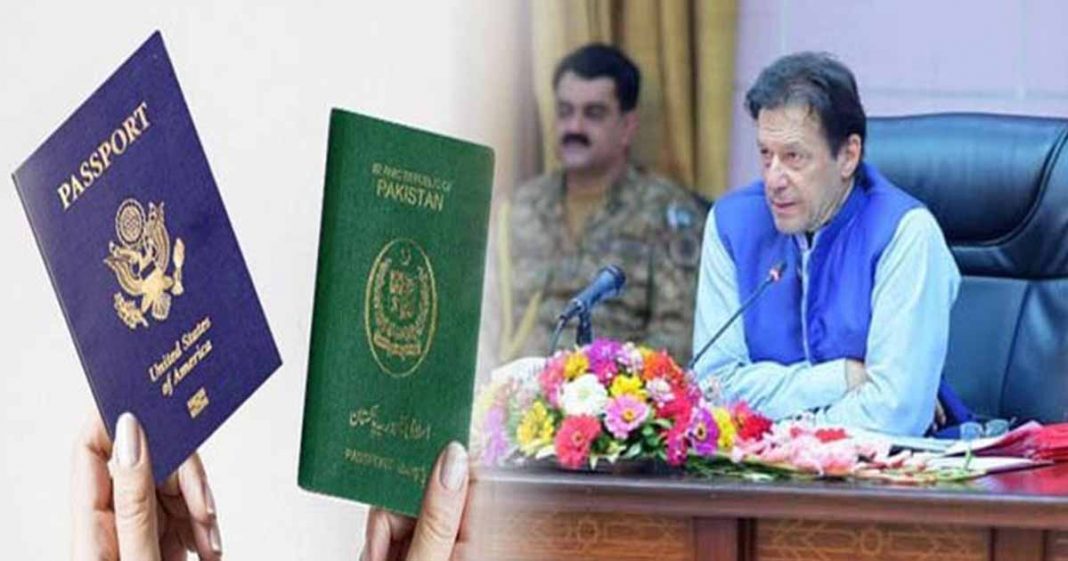Federal government has announced to bring a constitutional amendment bill aimed at seeking election reforms in the Parliament next week. The announcement was made by Adviser to PM on Parliamentary Affairs Babar Awan, who said that they have proposed an amendment in article 63 (1) C of the Constitution of Pakistan.
“The first part of the bill would include an amendment aimed at holding the polls through the open ballot,” he said.
The constitutional amendment, Babar Awan said would further allow a dual national to participate in the elections, however, he had to leave his citizenship of another country after being elected.
“The winning candidate will file proofs with the concerned authority regarding shunning his dual citizenship,” Babar Awan said adding that in case of defeat, the candidate would not need to leave the citizenship.
The amendment would allow a dual citizen to contest polls in the country, said the adviser.
Responding to the proposed amendment, PML-N leader Zubair Umar asked as to for whom such an amendment is being brought. “Such people wanted to play on both sides of the wicket,” he said.
Read more: Should dual nationals be part of the cabinet?
Earlier in the day, PM Imran Khan chaired a session of the government spokespersons, where the federal government has decided to make amendments in the Constitution for holding the Senate polls through the open ballot.
Dual Nationality synonymous with Dual Loyalty?
Pakistani law recognizes that the nationality of another country is attained for the purposes of unlocking greater economic opportunities. This undermines what is means to be a Pakistani – the person’s fate is no longer tied to that of Pakistan’s which may result in a lukewarm attitude towards rectifying the country’s institutions for the better.
Duality of nationality runs the risk of bias which can impinge on transparency of Pakistan’s nascent systems. For example, a conflict of interest can arise in the case of voting in favour/disfavour of a Parliamentary resolution on NATO supply routes.
While it is true that remittances ($24 bn in 2020) sent by overseas Pakistanis boost Pakistan’s economy, for which dual nationality holders are respected but simultaneously, it must be recognized that it is meant for their families back home and it cannot be counted as a direct contribution for the benefit of country.
No standard international practices in Pakistan
Countries are not obliged under international law to recognise dual nationality, resulting in two extremes. At one end of the spectrum are countries who leniently grant dual nationals full rights whereas on the other hand, countries take stringent measures to revoke citizenship and place sanctions.
In the multicultural society of U.K., dual nationality is protected. Along with becoming a British citizen, individuals are allowed to retain nationality of their country of origin. Dual nationals henceforth, contest elections as long as they’re not members of another country’s legislature.
U.S. also permits entry of dual nationals in the legislature, singling out one exception. U.S. Supreme Court states, “Under our Constitution, a naturalised citizen stands on an equal footing with the native citizen in all respects, save that of eligibility to the Presidency.”
Read more: Turkey-Pakistan Dual Nationality Plan: Easier to Live, Work & Gain Nationality
On the contrary, dual nationality is not recognized by the Indian Constitution. In order to be accepted as Indian, individuals are to renounce their former citizenship. An alternate is offered – Overseas Citizens of India (OCI) but, it doesn’t ensure political rights.
Pakistan’s take on dual nationality at variance with other countries
Pakistan falls somewhat in the middle of this continuum. The citizenship of a Pakistani woman is restored if her marriage with a foreign national ends and similarly, minors retain their citizenship as long as the father remains a Pakistani. Former Chief Election Commissioner, Justice Mirza recognized that a dual national must be disqualified from the Service of Pakistan yet, many sitting parliamentarians possess citizenship of other countries which illuminates the soft implementation of clauses.
PILDAT maintains that Pakistan is tolerant, conferring dual nationals the right to vote. Overseas Pakistanis scattered in 150 countries make up the world’s sixth largest diaspora, so out-of-country voting facility was a requirement which after more than 25 years of struggle, found a digital solution. Now, there’s a possibility that overseas Pakistanis would be able to exercise their voting rights in the upcoming polls of 2023 through I-voting system.
Weighing up the loss from Pakistan’s ‘singular’ nationality laws
Pakistan’s brain drain is rampant. About half a million Pakistanis, mostly university students, packed their bags to leave the country. Throughout studies and stepping into professions, they’ve had the opportunity to claim dual nationality – the prospect of which seems more attractive than solely possessing green passport which globally ranks as low as 104th.
Read more: Dual Nationality is negation to the Article 62 & 63 (c)
Many have lived a large chunk of their lives in Pakistan, but they remain deprived of political rights simply because they carry the label for being born in another country – for which they had no active choice. Commentators and analysts appreciate Pakistan’s effort to change the laws and facilitate dual nationals.














